Faith A. Colburn's Blog, page 5
July 14, 2017
How Do My 1930s Characters Dress?
During the 1920s, men’s fashions tended toward loose-fitting garments–baggy, high-waisted zoot suit with a watch chain dangling to the knee. Long, often double-breasted, jackets featured massive shoulder pads. A fedora completed the ensemble. Then came the stock market crash and years of hard times.
Fashion for both men and women switched to skinnier garments requiring less fabric. Suit jackets still had wide lapels that extended almost to the belt line and had padded broad shoulders. Trousers still had wide legs, but not nearly as wide as zoot suits. They had cuffs and center creases with a narrow waist set as much as three inches above the navel. Hats remained essential and men wore a lot of wingtips.
The first polo shirts came out during the thirties, as did Indiana Jones style Bush shirts with four patch pockets. Sweaters and short jackets came out during those years as well.
Since Jack and Bobbi spend a lot of time swimming, I spent some time looking at swimsuits. Men’s swim trunks without tops also came out during those years–as well as women’s two-piece swimsuits. For Bobbi’s work clothes, click here.
For Jack, I found some thirties-era casual ensembles.
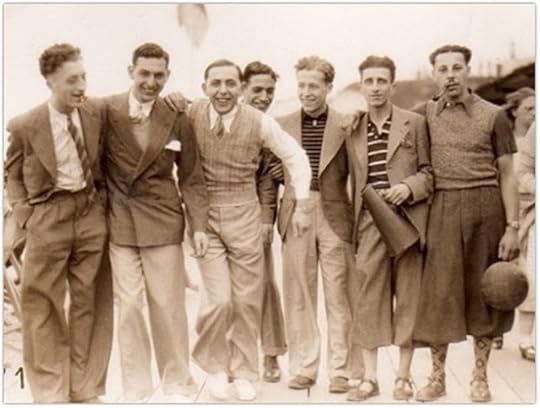 I see Jack wearing something like the outfit, second from the left, for more formal dates and maybe third from the right other times.
I see Jack wearing something like the outfit, second from the left, for more formal dates and maybe third from the right other times.I think Tony would have worn suits the times he spent with Bobbi–except the first time they met on the street near Bobbi’s apartment.
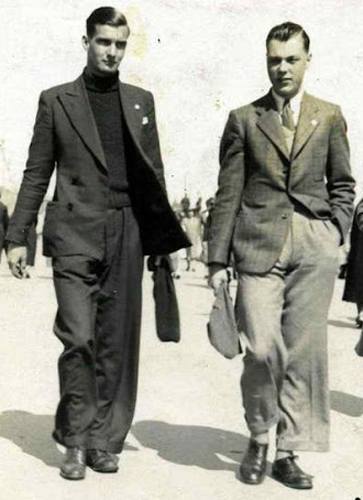 Either of these might have been every day attire for Tony. I suspect more like the dark suit on the left when he can Bobbi haunt the night clubs.
Either of these might have been every day attire for Tony. I suspect more like the dark suit on the left when he can Bobbi haunt the night clubs. Gentleman wearing thirties-era three-piece suit with fedora.
Gentleman wearing thirties-era three-piece suit with fedora.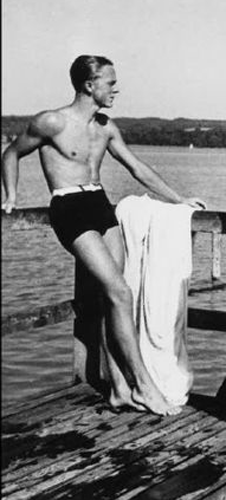 Jack would have had the latest in swimsuits. In this case topless.
Jack would have had the latest in swimsuits. In this case topless.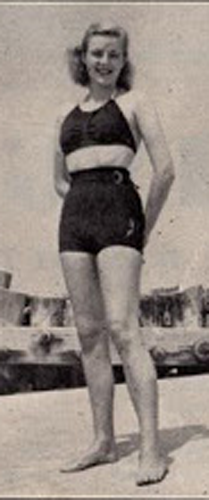 Bobbi, too, by the time she has the Pavilion job, would have been able to afford a new swimsuit, if little else.
Bobbi, too, by the time she has the Pavilion job, would have been able to afford a new swimsuit, if little else.
How Do My 1930s Characters Dress?
During the 1920s, men’s fashions tended toward loose-fitting garments–baggy, high-waisted zoot suit with a watch chain dangling to the knee. Long, often double-breasted, jackets featured massive shoulder pads. A fedora completed the ensemble. Then came the stock market crash and years of hard times.
Fashion for both men and women switched to skinnier garments requiring less fabric. Suit jackets still had wide lapels that extended almost to the belt line and had padded broad shoulders. Trousers still had wide legs, but not nearly as wide as zoot suits. They had cuffs and center creases with a narrow waist set as much as three inches above the navel. Hats remained essential and men wore a lot of wingtips.
The first polo shirts came out during the thirties, as did Indiana Jones style Bush shirts with four patch pockets. Sweaters and short jackets came out during those years as well.
Since Jack and Bobbi spend a lot of time swimming, I spent some time looking at swimsuits. Men’s swim trunks without tops also came out during those years–as well as women’s two-piece swimsuits. For Bobbi’s work clothes, click here.
For Jack, I found some thirties-era casual ensembles.
 I see Jack wearing something like the outfit, second from the left, for more formal dates and maybe third from the right other times.
I see Jack wearing something like the outfit, second from the left, for more formal dates and maybe third from the right other times.I think Tony would have worn suits the times he spent with Bobbi–except the first time they met on the street near Bobbi’s apartment.
 Either of these might have been every day attire for Tony. I suspect more like the dark suit on the left when he can Bobbi haunt the night clubs.
Either of these might have been every day attire for Tony. I suspect more like the dark suit on the left when he can Bobbi haunt the night clubs. Gentleman wearing thirties-era three-piece suit with fedora.
Gentleman wearing thirties-era three-piece suit with fedora. Jack would have had the latest in swimsuits. In this case topless.
Jack would have had the latest in swimsuits. In this case topless. Bobbi, too, by the time she has the Pavilion job, would have been able to afford a new swimsuit, if little else.
Bobbi, too, by the time she has the Pavilion job, would have been able to afford a new swimsuit, if little else.
July 7, 2017
Big Band Novel Cover Design
She wanted to be an artist, but everyone told her she had a great voice and she should become a singer. When the economy crashed, though, she had no choice but to take the job that was available—singing in a nightclub with a big band orchestra. Security was never part of the mix.
I’m still tinkering with my cover blurb (back cover) but I’m really pleased with my front cover. I “bought” the use of this image and was glad to pay, not only because it’s the only one I could find with a period microphone, but also because it’s just a great image. It shows my Big Band Canary alone—even though we know she’s backed by an orchestra. Throughout the novel we find her, time after time, forced to solve her problems alone, so that sense of isolation and suspense seems appropriate.
With the addition of the spine, we will have a color gradient from the bottom outside corner, back cover, to the top outside corner, front cover, going from light cigarette-smoke blue to the behind-the-spotlights black you see on this image
I chose the typeface on the advice of a much better cover designer than I. My original type was pretty common—my trademark interior typeface of Century Schoolbook—but this uncommon papyrus face really does make the cover pop.
So here she is, my reluctant canary, singing for her supper.
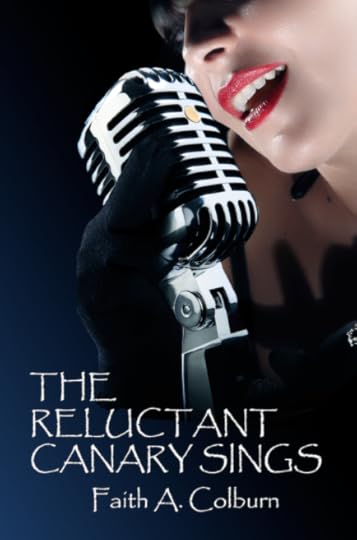 Front cover. Novel to be released in late August.
Front cover. Novel to be released in late August.
Big Band Novel Cover Design
She wanted to be an artist, but everyone told her she had a great voice and she should become a singer. When the economy crashed, though, she had no choice but to take the job that was available—singing in a nightclub with a big band orchestra. Security was never part of the mix.
I’m still tinkering with my cover blurb (back cover) but I’m really pleased with my front cover. I “bought” the use of this image and was glad to pay, not only because it’s the only one I could find with a period microphone, but also because it’s just a great image. It shows my Big Band Canary alone—even though we know she’s backed by an orchestra. Throughout the novel we find her, time after time, forced to solve her problems alone, so that sense of isolation and suspense seems appropriate.
With the addition of the spine, we will have a color gradient from the bottom outside corner, back cover, to the top outside corner, front cover, going from light cigarette-smoke blue to the behind-the-spotlights black you see on this image
I chose the typeface on the advice of a much better cover designer than I. My original type was pretty common—my trademark interior typeface of Century Schoolbook—but this uncommon papyrus face really does make the cover pop.
So here she is, my reluctant canary, singing for her supper.
 Front cover. Novel to be released in late August.
Front cover. Novel to be released in late August.
June 30, 2017
Vintage Cars
I gave very little thought to cars as I wrote The Reluctant Canary Sings, but I realized I had a couple of characters who needed to drive them. I went out to find cars for them.
While looking for what are now vintage automobiles, I learned that Cleveland was once the car capital of the world. In fact, The Cleveland Leader once claimed it was leading automobile manufacturer in the “Universe.” According to a blog entitled the Cleveland Storyteller, city manufacturers made 115 makes of cars between 1896 and 1932. A former bicycle manufacturer, Scottish immigrant Alexander Winton, made the first of them with a two-cycle, two-horsepower internal combustion engine. He drove it all the way to Elyria at twelve miles per hour. He incorporated the Winton Motor Carriage Company and standardized his design for mass production.
Another Cleveland manufacturer, Walter Baker, chose a different path—an electric car. The Baker Motor Vehicle Company’s car had ten batteries that produced three-fourths of a horse for twenty minutes before a needed recharge. I decided my characters needed more driving time.
The White Sewing Machine Company got in the business at the turn of the century with its steam-powered cars. The company made more cars than any of the others for a few years, but converted to gasoline engines between 1909 and 1911.
By the 1930s cheap gas made it the fuel of choice for almost all auto manufacturers, so I chose cars with internal combustion engines. For one character, I needed an expensive luxury car. I chose a 1937 Packard convertible for Jack, even though it was manufactured in Detroit.
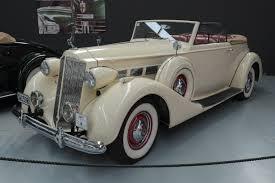 Unlike Bobbi’s family, Jack’s has money. Nothing but the best for their youngest son.
Unlike Bobbi’s family, Jack’s has money. Nothing but the best for their youngest son.For another character who drives, I needed a less expensive car—a used 1932 Chrysler DeSoto. (Notice both my drivers are male.)
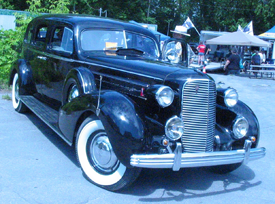 As a bouncer at the LakeView Jazz Club, Tony has less money than Jack so he selects quality used cars. This is his 1932 Chrysler DeSoto.
As a bouncer at the LakeView Jazz Club, Tony has less money than Jack so he selects quality used cars. This is his 1932 Chrysler DeSoto.For more about the early days of automobile manufacture in Cleveland, you will find Case Western Reserve University’s Encyclopedia of Cleveland History here. You will find numerous images of cars made in Cleveland here.
I especially like the silver Rocket Car—replicating the tethered “vehicles” on the amusement park ride at Euclid Beach Park, also in Cleveland. You can actually ride in one now in Florida.
Vintage Cars
I gave very little thought to cars as I wrote The Reluctant Canary Sings, but I realized I had a couple of characters who needed to drive them. I went out to find cars for them.
While looking for what are now vintage automobiles, I learned that Cleveland was once the car capital of the world. In fact, The Cleveland Leader once claimed it was leading automobile manufacturer in the “Universe.” According to a blog entitled the Cleveland Storyteller, city manufacturers made 115 makes of cars between 1896 and 1932. A former bicycle manufacturer, Scottish immigrant Alexander Winton, made the first of them with a two-cycle, two-horsepower internal combustion engine. He drove it all the way to Elyria at twelve miles per hour. He incorporated the Winton Motor Carriage Company and standardized his design for mass production.
Another Cleveland manufacturer, Walter Baker, chose a different path—an electric car. The Baker Motor Vehicle Company’s car had ten batteries that produced three-fourths of a horse for twenty minutes before a needed recharge. I decided my characters needed more driving time.
The White Sewing Machine Company got in the business at the turn of the century with its steam-powered cars. The company made more cars than any of the others for a few years, but converted to gasoline engines between 1909 and 1911.
By the 1930s cheap gas made it the fuel of choice for almost all auto manufacturers, so I chose cars with internal combustion engines. For one character, I needed an expensive luxury car. I chose a 1937 Packard convertible for Jack, even though it was manufactured in Detroit.
 Unlike Bobbi’s family, Jack’s has money. Nothing but the best for their youngest son.
Unlike Bobbi’s family, Jack’s has money. Nothing but the best for their youngest son.For another character who drives, I needed a less expensive car—a used 1932 Chrysler DeSoto. (Notice both my drivers are male.)
 As a bouncer at the LakeView Jazz Club, Tony has less money than Jack so he selects quality used cars. This is his 1932 Chrysler DeSoto.
As a bouncer at the LakeView Jazz Club, Tony has less money than Jack so he selects quality used cars. This is his 1932 Chrysler DeSoto.For more about the early days of automobile manufacture in Cleveland, you will find Case Western Reserve University’s Encyclopedia of Cleveland History here. You will find numerous images of cars made in Cleveland here.
I especially like the silver Rocket Car—replicating the tethered “vehicles” on the amusement park ride at Euclid Beach Park, also in Cleveland. You can actually ride in one now in Florida.
June 24, 2017
Help Wanted: Street Team
 I imagine a smooth effort, like a rowing team as I recruit my street team.
I imagine a smooth effort, like a rowing team as I recruit my street team.I’m doing a final sentence edit for The Reluctant Canary Sings, so I’m looking for a street team to help me promote it. For those of you who have never been on a street team, I define it as a group of people who help me promote my book.
Here’s the elevator pitch: Bobbi Bowen lives in Cleveland. It’s 1937 in the second dip of a double-dip depression. When she leaves the apartment, she passes the Holy Rosary Soup Kitchen, with its straggle of shuffling men and women in their bedraggled coats. Most days she hums the new swing tunes—Cream Puff or Sing, Sing, Sing— because it seems every time she turns the radio on, she hears about another dismembered body left lying around town. At home, she ducks her parents’ fights—sometimes ducking a flying plate or saucer. So when the bank cuts her mother’s hours, she’s got one chance to keep a roof over her family’s heads—to turn her voice, her most private pleasure, into a public commodity. At the end of her sophomore year, she forever gives up her dream of art school to spend her nights singing in nightclubs and bars. Even though she’s able to make enough to support her family, security remains an illusion she can’t seem to capture no matter how hard she tries. Is she making herself bait? Will her father’s betrayal destroy her?
Here’s what I’m asking you to do:
I will send you advance, digital copies of the book as soon as I have the words right—with the hope that you will review it for me when it goes live on Amazon. I will send you the link to make that easy.
I would love you to share the news about my book on your blog and/or any other social media you use. For example, when I do my cover reveal, I’d love it if you would link to that, maybe a sentence or two about it when the book goes live.
Maybe even host me on your blog with an interview.
When I have a sale, or a freebee, I’d like you to please tell your friends and link to the sale site, so I can get more people familiar with my singing canary.
I would love to have you on my team, spreading the word about the Reluctant Canary.
Once we’ve got the book rolling, I’d like to get everyone together in some central location for a little party—maybe listen to some of that swing era music my canary sings, maybe imbibe some ‘30s- and ‘40s-era cocktails, maybe eat a bit of that amaretto cheesecake Bobbi’s making when her dad breaks his leg.
Look for something next week about cars of the 1930s and the specific ones I have my characters drive.
Help Wanted: Street Team
 I imagine a smooth effort, like a rowing team as I recruit my street team.
I imagine a smooth effort, like a rowing team as I recruit my street team.I’m doing a final sentence edit for The Reluctant Canary Sings, so I’m looking for a street team to help me promote it. For those of you who have never been on a street team, I define it as a group of people who help me promote my book.
Here’s the elevator pitch: Bobbi Bowen lives in Cleveland. It’s 1937 in the second dip of a double-dip depression. When she leaves the apartment, she passes the Holy Rosary Soup Kitchen, with its straggle of shuffling men and women in their bedraggled coats. Most days she hums the new swing tunes—Cream Puff or Sing, Sing, Sing— because it seems every time she turns the radio on, she hears about another dismembered body left lying around town. At home, she ducks her parents’ fights—sometimes ducking a flying plate or saucer. So when the bank cuts her mother’s hours, she’s got one chance to keep a roof over her family’s heads—to turn her voice, her most private pleasure, into a public commodity. At the end of her sophomore year, she forever gives up her dream of art school to spend her nights singing in nightclubs and bars. Even though she’s able to make enough to support her family, security remains an illusion she can’t seem to capture no matter how hard she tries. Is she making herself bait? Will her father’s betrayal destroy her?
Here’s what I’m asking you to do:
I will send you advance, digital copies of the book as soon as I have the words right—with the hope that you will review it for me when it goes live on Amazon. I will send you the link to make that easy.
I would love you to share the news about my book on your blog and/or any other social media you use. For example, when I do my cover reveal, I’d love it if you would link to that, maybe a sentence or two about it when the book goes live.
Maybe even host me on your blog with an interview.
When I have a sale, or a freebee, I’d like you to please tell your friends and link to the sale site, so I can get more people familiar with my singing canary.
I would love to have you on my team, spreading the word about the Reluctant Canary.
Once we’ve got the book rolling, I’d like to get everyone together in some central location for a little party—maybe listen to some of that swing era music my canary sings, maybe imbibe some ‘30s- and ‘40s-era cocktails, maybe eat a bit of that amaretto cheesecake Bobbi’s making when her dad breaks his leg.
Look for something next week about cars of the 1930s and the specific ones I have my characters drive.
June 15, 2017
Dragon’s Eggs
 Paul wonders if he might have been hatched from a dragon’s egg.
Paul wonders if he might have been hatched from a dragon’s egg.Often Bobbi seems like the only adult in the house, but her parents have their own challenges. Bobbi knows that her grandmother, diagnosed paranoid schizophrenic, lives in a mental institution–her mother took her there to visit once. During a thunderstorm, and after her father has stormed out of the apartment, she learns a few more things from her mother.
“Bobbi, they fought and they fought and they fought . . . My mother was not one to let him have his way just because he was the man—because he was bigger and stronger.” She got quiet then, but in a moment she seemed to rouse herself. “Guess I got that from her.” She glanced at me and back out the window, “but I never remember her talking about anything that wasn’t real.”
“But wouldn’t the doctors know?” I was a little surprised at myself that I didn’t question my grandfather’s willingness to send his own wife off to be imprisoned and tortured—because that’s what the place felt like—full of silence pregnant with fear, and screams that echoed down long halls. I’d never even met my grandfather yet I willingly accepted such a harsh judgment. I wondered if that was only coming from my mom—or somewhere in me.
“Bobbi, it seems to me that they all figure any woman who doesn’t agree with her husband—or any man—must be crazy.” Mom continued to stare at the bricks across the alley, her voice expressionless.
“You don’t think she was . . .?”
“I don’t know, Bobbi. Sometimes—a lot of times—she,” Mom glanced at me and back out the window, “she’d just blow up, yelling and screaming at stuff that normally didn’t bother her.” Mom fidgeted with her nightgown again. “The little kids would run and hide and just shiver in fear.”
“What did you do?”
“Kind of ducked my head and did whatever she wanted—if I could figure it out—and wait for her to wear herself out.”
“Was she always like that?”
Mom frowned. “Seems like it started when I was about . . . ten . . . maybe eleven . . . after Mildred was born. We all worried she’d hurt Millie when she’d get mad, so I’d try to grab the baby and keep her quiet.”
“What about your dad? Couldn’t he keep her calm?”
“Like I said, they just fought and fought.” Mom glanced over her shoulder at me and back out the window. “He’d tell her to calm down. He might try to get hold of her hands, ‘cause she’d be striking at him—and she’d scream at him about some other woman. She’d get wild sometimes with anger, always about his women—kickin’ and spittin’.”
“Were there other women?”
“I don’t know, Bobbi. I was just a kid. He was gone a lot.”
“Is that when they put her in the asylum?”
“No. Not then. She had three more babies and the blowups happened more and more often and father couldn’t control her at all—nobody could.” Mom’s fidgeting in her lap got more agitated. “And then we were all scattered out everywhere.” She turned to me. “You don’t need to hear this, Bobbi. I’m sorry . . .”
“No, Mom, no wonder you get scared sometimes. I’m glad you told me.”
We both stare out the window at the wet bricks across the way, listening to the thunder. “What about your dad then, what did he do after . . .”
“After he had her locked up?”
“Yeah.”
“Well he farmed all us kids out with the relatives. And he was there all by himself so he could drink all he wanted and do nothin’.” She shook her head, clucking her tongue. “I don’t know—did she just wear him out? Did he drive her crazy? He just gave up on everything; didn’t even try to get the kids back.” She sighed. “I stayed with my friend, Evelyn. I was sixteen and her parents let me stay until I married your father.”
“What about your brothers and sisters?”
“They all went . . . no two together.” Mom looks around at me, her eyes indistinct—like flat, muddy ponds. “We never saw each other again . . . I’ve tried to find them.”
“That’s why . . .”
“That’s why we never see my family—except Moreen. She’s the only one I ever found.”
“And she never found the others?”
“The family disowned us, Moreen and me.”
“Why?”
“We were Irish Catholics.”
“So?”
“She and I married Protestants.”
“They disowned you?!”
“That’s what they did back then.”
I couldn’t say anything. Just sat there and thought about how miserable my mom’s life had been.
“And your dad was an orphan.”
I stared at my mom, mind locked. “Wait a minute. What about the watch?”
“The sisters gave it to him when he left. Said they found it in the box with him.”
“Box?”
“Yeah. An apple box. On the steps.”
“That’s awful. What happened to his parents?”
“Well, nobody knows. There was a big diphtheria epidemic about that time. Maybe his parents died and some neighbor took him. Or maybe his mama died having him . . . I don’t know.”
“Wouldn’t somebody keep track?”
“Apparently not. He says that watch is the only proof he has that he came from real people. Otherwise, he says, he’d have to think he hatched out of a dragon’s egg—I think they treated him pretty rough.”
“So there was just the two of you then.”
“And then you came along . . .”
Mom turned back to the window. “Just the two of us,” Her voice trailed off and she stared at the bricks across the alley. “just tryin’ to be normal . . . an’ we don’t know what that’s like or how to make a family. How would we know?”
She seemed to be talking to herself, so I just listened.
“An’ so mad . . . him just a little baby boy an’ no parents . . . nobody to love him. Just tellin’ him to keep his mouth shut an’ do what he’s told. An’ me—listenin’ to ‘em fight . . . an’ her screaming and clawin’ at him about his women an’ him hittin’ her and tryin’ to shut her up. No wonder she went crazy . . . or maybe it was him went crazy.”
A flash of lightning illuminated the bricks across the way and nearly blinded both of us. Blinking, we waited for the thunder.
“I always swore I’d never be like them—your dad and I made a kind of pact—but sometimes I feel like I’m gonna explode, like my skin’s stretching and stretching and I’m gonna blow up and splatter all over.” Mom looked back at me again. “I’m sorry—I try to be calm—I get so scared I’m like her.”
“You’re not, mom. I’m scared too. It’s hard to be poor.”
When the thunder came, it was a low, guttering growl. We sat watching lightning flashes on the wall as the storm retreated, rolling and growling away like a dragon that’s seeking its egg.
Dragon’s Eggs
 Paul wonders if he might have been hatched from a dragon’s egg.
Paul wonders if he might have been hatched from a dragon’s egg.Often Bobbi seems like the only adult in the house, but her parents have their own challenges. Bobbi knows that her grandmother, diagnosed paranoid schizophrenic, lives in a mental institution–her mother took her there to visit once. During a thunderstorm, and after her father has stormed out of the apartment, she learns a few more things from her mother.
“Bobbi, they fought and they fought and they fought . . . My mother was not one to let him have his way just because he was the man—because he was bigger and stronger.” She got quiet then, but in a moment she seemed to rouse herself. “Guess I got that from her.” She glanced at me and back out the window, “but I never remember her talking about anything that wasn’t real.”
“But wouldn’t the doctors know?” I was a little surprised at myself that I didn’t question my grandfather’s willingness to send his own wife off to be imprisoned and tortured—because that’s what the place felt like—full of silence pregnant with fear, and screams that echoed down long halls. I’d never even met my grandfather yet I willingly accepted such a harsh judgment. I wondered if that was only coming from my mom—or somewhere in me.
“Bobbi, it seems to me that they all figure any woman who doesn’t agree with her husband—or any man—must be crazy.” Mom continued to stare at the bricks across the alley, her voice expressionless.
“You don’t think she was . . .?”
“I don’t know, Bobbi. Sometimes—a lot of times—she,” Mom glanced at me and back out the window, “she’d just blow up, yelling and screaming at stuff that normally didn’t bother her.” Mom fidgeted with her nightgown again. “The little kids would run and hide and just shiver in fear.”
“What did you do?”
“Kind of ducked my head and did whatever she wanted—if I could figure it out—and wait for her to wear herself out.”
“Was she always like that?”
Mom frowned. “Seems like it started when I was about . . . ten . . . maybe eleven . . . after Mildred was born. We all worried she’d hurt Millie when she’d get mad, so I’d try to grab the baby and keep her quiet.”
“What about your dad? Couldn’t he keep her calm?”
“Like I said, they just fought and fought.” Mom glanced over her shoulder at me and back out the window. “He’d tell her to calm down. He might try to get hold of her hands, ‘cause she’d be striking at him—and she’d scream at him about some other woman. She’d get wild sometimes with anger, always about his women—kickin’ and spittin’.”
“Were there other women?”
“I don’t know, Bobbi. I was just a kid. He was gone a lot.”
“Is that when they put her in the asylum?”
“No. Not then. She had three more babies and the blowups happened more and more often and father couldn’t control her at all—nobody could.” Mom’s fidgeting in her lap got more agitated. “And then we were all scattered out everywhere.” She turned to me. “You don’t need to hear this, Bobbi. I’m sorry . . .”
“No, Mom, no wonder you get scared sometimes. I’m glad you told me.”
We both stare out the window at the wet bricks across the way, listening to the thunder. “What about your dad then, what did he do after . . .”
“After he had her locked up?”
“Yeah.”
“Well he farmed all us kids out with the relatives. And he was there all by himself so he could drink all he wanted and do nothin’.” She shook her head, clucking her tongue. “I don’t know—did she just wear him out? Did he drive her crazy? He just gave up on everything; didn’t even try to get the kids back.” She sighed. “I stayed with my friend, Evelyn. I was sixteen and her parents let me stay until I married your father.”
“What about your brothers and sisters?”
“They all went . . . no two together.” Mom looks around at me, her eyes indistinct—like flat, muddy ponds. “We never saw each other again . . . I’ve tried to find them.”
“That’s why . . .”
“That’s why we never see my family—except Moreen. She’s the only one I ever found.”
“And she never found the others?”
“The family disowned us, Moreen and me.”
“Why?”
“We were Irish Catholics.”
“So?”
“She and I married Protestants.”
“They disowned you?!”
“That’s what they did back then.”
I couldn’t say anything. Just sat there and thought about how miserable my mom’s life had been.
“And your dad was an orphan.”
I stared at my mom, mind locked. “Wait a minute. What about the watch?”
“The sisters gave it to him when he left. Said they found it in the box with him.”
“Box?”
“Yeah. An apple box. On the steps.”
“That’s awful. What happened to his parents?”
“Well, nobody knows. There was a big diphtheria epidemic about that time. Maybe his parents died and some neighbor took him. Or maybe his mama died having him . . . I don’t know.”
“Wouldn’t somebody keep track?”
“Apparently not. He says that watch is the only proof he has that he came from real people. Otherwise, he says, he’d have to think he hatched out of a dragon’s egg—I think they treated him pretty rough.”
“So there was just the two of you then.”
“And then you came along . . .”
Mom turned back to the window. “Just the two of us,” Her voice trailed off and she stared at the bricks across the alley. “just tryin’ to be normal . . . an’ we don’t know what that’s like or how to make a family. How would we know?”
She seemed to be talking to herself, so I just listened.
“An’ so mad . . . him just a little baby boy an’ no parents . . . nobody to love him. Just tellin’ him to keep his mouth shut an’ do what he’s told. An’ me—listenin’ to ‘em fight . . . an’ her screaming and clawin’ at him about his women an’ him hittin’ her and tryin’ to shut her up. No wonder she went crazy . . . or maybe it was him went crazy.”
A flash of lightning illuminated the bricks across the way and nearly blinded both of us. Blinking, we waited for the thunder.
“I always swore I’d never be like them—your dad and I made a kind of pact—but sometimes I feel like I’m gonna explode, like my skin’s stretching and stretching and I’m gonna blow up and splatter all over.” Mom looked back at me again. “I’m sorry—I try to be calm—I get so scared I’m like her.”
“You’re not, mom. I’m scared too. It’s hard to be poor.”
When the thunder came, it was a low, guttering growl. We sat watching lightning flashes on the wall as the storm retreated, rolling and growling away like a dragon that’s seeking its egg.



